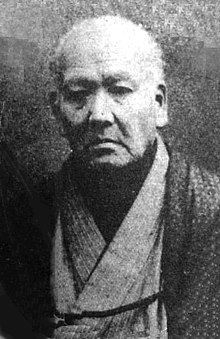Kawatake Mokuami 河竹黙阿弥 | |
|---|---|
 Portrait of Mokuami Kawatake | |
| Born | 1 March 1816 Nihonbashi, Chūō-ku, Tokyo, Japan |
| Died | 22 January 1893 Tokyo, Japan |
| Occupation | Kabuki |
| Nationality | Japanese |
| Period | Edo |
| Genre | |
| Parent | Kanbei Yoshimura (father) |
| Relatives | Kawatake Shigetoshi (adopted son) |
Kawatake Mokuami (河竹黙阿弥) (birth name Yoshimura Yoshisaburō; 吉村芳三郎) (1 March 1816 – 22 January 1893) was a Japanese dramatist of Kabuki. It has been said[by whom?] that "as a writer of plays of Kabuki origin, he was one of the greatest, if not the greatest, Japan has ever known".[1] He wrote 150 or so plays over the course of his 58-year career,[2] covering a wide variety of themes, styles, and forms, including short dance pieces, period plays (jidaimono), contemporary genre pieces (sewamono), tragedies and comedies, as well as adaptations of foreign (Western) stories,[3] though he is perhaps most famous for his shiranamimono, plays featuring sympathetic or tragic rogues and thieves.[4] For the greater part of his career he wrote under the professional name Kawatake Shinshichi, only taking the name Mokuami on his retirement from the stage in 1881.
- ^ Miyake, Shutarō. Kabuki Drama. Tokyo: Japan Travel Bureau, Inc., 1971. p50.
- ^ Miyake. p149.
- ^ "Kawatake Mokuami". Kabuki Jiten (歌舞伎事典, "Kabuki Encyclopedia"). Japan Arts Council, 2001-2003. Accessed 26 September 2008.
- ^ Kawade Shobō Shinsha Editorial Team (eds.). "'Shiranami sakusha' to yobareta Kawatake Mokuami" (「白波作者」と呼ばれた河竹黙阿弥, "Kawatake Mokuami, who was called the 'Shiranami Writer'"). Ō-Edo Rekishi Hyakka (大江戸歴史百科, "Historical Encyclopedia of Great Edo"). Tokyo: Kawade Shobō Shinsha Publishers, 2007. p198.